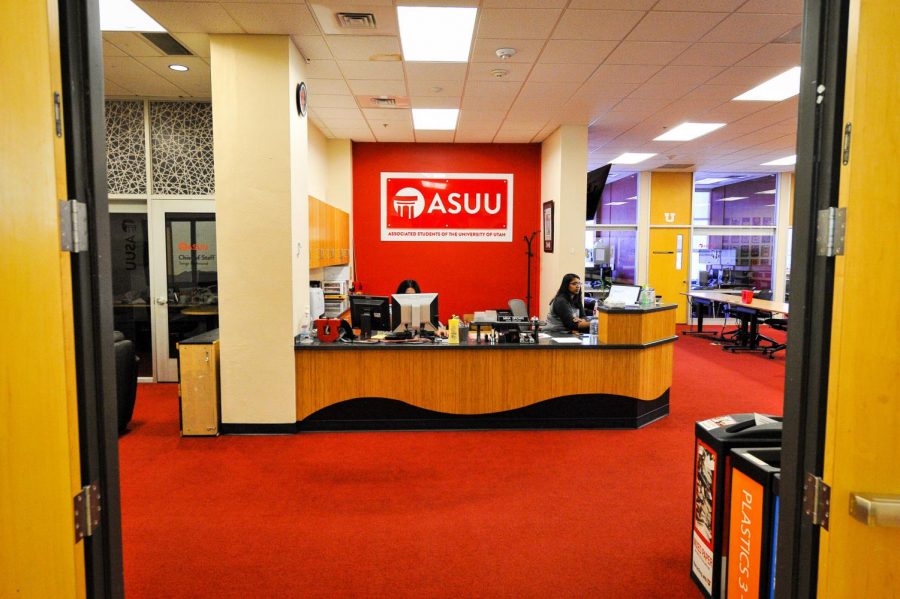ASUU Senate Meets to Discuss New Resolutions as Semester Comes to a Close
Laura Seymour and Mina Brown at the welcome desk at the ASUU offices in the Ray A. Olpin Student Union on the University of Utah Campus, Salt Lake City, UT on Thursday, July 13, 2017. (Photo by Adam Fondren | The Daily Utah Chronicle)
December 11, 2020
On Dec. 10, ASUU held a senate meeting to discuss three resolutions, including Joint Resolution 10: “A Resolution Condemning the Utah Inland Port” written by the Sustainability Board.
According to the Utah Inland Port Authority, “An Inland Port provides shippers and carriers with a place to conduct transactions and transfer the goods Utah households and businesses depend on — an anchor for the economy in the face of supply chain shocks.”
While the inland port is poised to benefit businesses and communities, some are concerned about its environmental impact on a valley already polluted.
“WHEREAS UIPA has failed to adequately evaluate the environmental and social impacts of an inland port within the Salt Lake Valley,” the resolution reads.
The resolution says the inland port would negatively impact the air quality of Salt Lake County, which was graded an “F” by the American Lung Association.
According to the resolution, the six communities closest to the inland port are each composed of more than 50% BIPOC and would be the most impacted by the localized air quality.
The land where the inland port will be built is also considered sacred to the Shoshone, Ute and Goshute tribes. Thus, the resolution says it is contradictory for the University of Utah to issue an indigenous land acknowledgment yet “stand idly by” as the inland port is built on sacred land.
Another environmental concern listed in the resolution is the disruption to the ecosystems within the wetland areas.
The resolution also points to the potentially false claims of the inland port increasing the number of competitive jobs.
“WHEREAS, the University of Utah Kem C. Gardner Institute completed a Salt Lake Inland Port Assessment. The assessment projected a 3.0% increase in jobs due to the inland port with median hourly wages of $17.45,” the resolution reads.
After Joint Resolution 10 passed unanimously in the senate, the meeting moved on to discussing Joint Resolution 11: A Resolution in Support of the Republic of Artsakh and the Armenian American Students in Utah.
Gregory Barashyan, a student studying biology and author of the resolution, gave a history of the Republic of Artsakh and his reasoning for writing the resolution.
“This issue is extremely important to me and the community of Armenians here at the University of Utah. Starting around September 27, the nation of Azerbaijan launched an attack on the autonomous region of the Republic of Artsakh which is internationally recognized as being a part of Azerbaijan but is almost 100% ethnically Armenian,” Barashyan said.
Barashyan said that war crimes continue to happen in the region, as well as a lack of acknowledging the right to self-determination of the people living within the Republic of Artsakh.
The resolution aims to give a voice to those being affected and bring awareness to the situation in the Republic of Artsakh.
“WHEREAS, As Armenian American students living in Utah we have observed an increase in Pro-Turkish agenda specifically in the broader context of educational curriculum,” the resolution reads.
Barashyan said there is a pro-Turkish agenda present at the U, citing the funding of the Muslim Studies department and the incident involving Professor Yavuz’s denial of the Armenian genocide.
“From what I understand, the Muslim Studies department also has received financial aid from the Turkish government itself and this is something that we don’t really find appropriate, especially considering the curriculum that has been instated,” Barashyan said.
The resolution is asking the U to stand in solidarity with Armenian students and be distributed to other universities in Utah.
This resolution passed unanimously in the senate as well, but has yet to be heard by the general assembly. Then, the meeting moved on to its final item of the night: Joint Resolution 13, A Bill in Support of a Student Legal Clinic on Campus, a student services committee initiative.
Director of Student Resources Shelby Cattani and Vice-chair of Student Services Zahra Saifee presented the resolution by introducing rates of interpersonal violence at the U.
According to the 2020 Campus Climate Survey, most students consider sexual assault and misconduct to be problematic at the U.
The resolution asks for the support of a $6 student fee per term to be allocated to an on-campus legal clinic that will address student’s legal questions and issues of interpersonal violence on campus.
“What we do realize is to get this idea off the ground, there needs to be student support for the allocation of a fee like this before we can get into the weeds of how we would form it,” Saifee said.
In addition to issues of interpersonal violence, the clinic will be for a variety of student legal issues.
“We hope that this legal clinic, through establishing this fee, can hire on full-time attorneys where their job is to provide students with free legal advice,” Saifee said.
The resolution passed unanimously in the Senate, but has yet to be heard in the general assembly.
If it passes in the assembly, the legal clinic is projected to be open and available for student use by Fall 2022.








